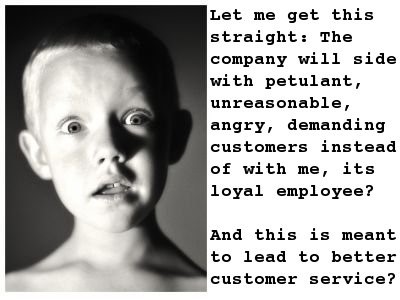 The entire hospitality trade, (so also the other trades in general) must believe in the fact that the guest (or a customer) is always right. Hoteliers know how volatile, delicate and impulsive their trade is and that how important their customers actually are. No matter how good we are at and whatever may be the kind of business that we are in, we will, at some point in time, face an irate customer. How we deal with our customers will not only determine how the client feels about our organisation, but how good we feel about ourselves.
The entire hospitality trade, (so also the other trades in general) must believe in the fact that the guest (or a customer) is always right. Hoteliers know how volatile, delicate and impulsive their trade is and that how important their customers actually are. No matter how good we are at and whatever may be the kind of business that we are in, we will, at some point in time, face an irate customer. How we deal with our customers will not only determine how the client feels about our organisation, but how good we feel about ourselves.
In a speech in South Africa in 1990, Mahatma Gandhi said:
“A customer is the most important visitor on our premises. He is not dependent on us. We are dependent on him. He is not an interruption of our work. He is the purpose of it. He is not an outsider of our business. He is part of it. We are not doing him a favour by serving him. He is doing us a favour by giving us the opportunity to do so.”
A very long time ago on the very first day when I had joined hotels, on my induction during which I was being taken around in the staff corridors, which are usually located in the lower ground floors, I noticed a few posters neatly mounted on the walls, amongst which was this one:
RULE NO 1 – The Customer is always right
RULE NO 2 – in case of any doubt, refer to rule no 1
This one surprised me a lot… is it really true that the guests are always right? Is the guest who stands to be right even when we know very well that he is wrong? Is it a done thing to always give the entire credibility and the last word to the guests? It is not true that customers are human beings like us and are also capable of (and do possess the right to) making a mistake? They also have the right to get confused, they exaggerate, or may even go to the extent of telling a lie. Isn’t that quite possible?
 So if the customer is wrong, (and you know that he is really wrong) what should you as a member of a service establishment do?
So if the customer is wrong, (and you know that he is really wrong) what should you as a member of a service establishment do?
You can still make the guest “feel right” by agreeing with them on the importance of what they value.
For example, your customer says “Your service is too slow!”
However, when you investigate and discover that everything was done the right way and, exactly on time. So what do you do? Tell the customer they are wrong? Actually, there are still a few ways in which you can make the amends and have the customer feel right!
When they say “Your service is slow, you say “You are correct, Sir. Speed is, in fact very important! Allow me to be the one to help you quickly…”
They say, “Your product is unreliable.” You say, “You have a very good point, that reliable performance really matters.”
They say, “Your staff is rude.” You say, “You always deserve our courtesy and respect.”
They say, “You people are so bureaucratic.” And you say, “Let’s see just how flexible we can be for you.”
They say, “Your price is too high.” You step over to their side, and say, “You deserve great value for your money, Sir”
They say, “Your systems are hard to use.” And you reply, “We are with you about the importance of user-friendly systems.”
So, is the customer always right? Well…yes and no.

One reason due to which the companies still manage to carry on and increase their businesses is because they still believe in the saying “The guest is always right”. These companies are the ones who respect their customers and feel that they are always right because their organization’s very existence depends on it. Everyone wants his/her customers to keep returning as well as feeling welcomed.
When you are able to turn an irate customer into a satisfied customer you will not only gain confidence in your ability to diffuse a volatile situation by also will be successful in evoking a positive outcome. This will surely lead to your gaining respect of your fellow colleagues and, who knows, it may even lead to your promotion.
 However, many organisations try to ignore their customers when their businesses are doing exceptionally well, they become complacent and self-righteous without realizing the fact that they can be on the verge of losing their business without the loyalty and the trustworthiness of their guests.
However, many organisations try to ignore their customers when their businesses are doing exceptionally well, they become complacent and self-righteous without realizing the fact that they can be on the verge of losing their business without the loyalty and the trustworthiness of their guests.
The belief in Customer is Always Right” also sets a standard for the customer service department that strives for excellence. Every guest matters. Guest service experiences are one of the leading causes for creating not only a brand loyalty but also to prevent a customer loss.
Allowing the guest to be right in the middle of disputes is a smart way to tactfully taper down the heat of the discussion and helps pacify guests. One must always focus on the big picture and, for some time, allow the things to take their natural course.
Many people believe that being a hotelier is not only a job but a life where they can develop & enhance their social skills, their diplomacy and their knowledge. Many others also believe it’s not a profession but it is a philosophy. A great hotelier should be confident, be knowledgeable, humble, polite, and equally possess a pleasant personality.
the amount of importance attached to a customer by which he earns the tag of “I am Mr. Right Always” is, as a matter of fact, directly proportionate to his financial status and to the social or political standing that he enjoys. This trap of classifying some people as VIPs may make the other people feel ordinary by which they are considered but as Very Intimidating People.
Customers who have complaints are, in a way, blessings in disguise. They will not only make you realize where your service stands, they will also show you an opportunity to correct them. This goes to say that you should be more concerned with the guests who complain than the ones who never do.
Irrespective of the room rate that a customer is paying you, he deserves a VIP status, on the basis of the fact that you as a hotelier have accepted his room booking, in the same way in which you have accepted the booking of any VIP.
Following steps are suggested while dealing with the irate customers.
- Listen carefully and with interest to what a customer is telling you.
- No matter who is at fault, you must apologize.
- Use phrases such as “I can understand, that must be upsetting or I wouldn’t blame you for being upset – I would do the same if I were in your shoes.
- Ask questions in a caring manner
- Suggest alternatives
- Involve others or superiors – you will surely find a solution.
It is a truth that we cannot challenge who has a complaint and is angry. We should never try to prove a customer wrong even if we do know that he is wrong. Our goals should always be to solve a problem and to not to get into the merits of the complaint. We must always stay focused on the topic and not look for any additional allied problems.
